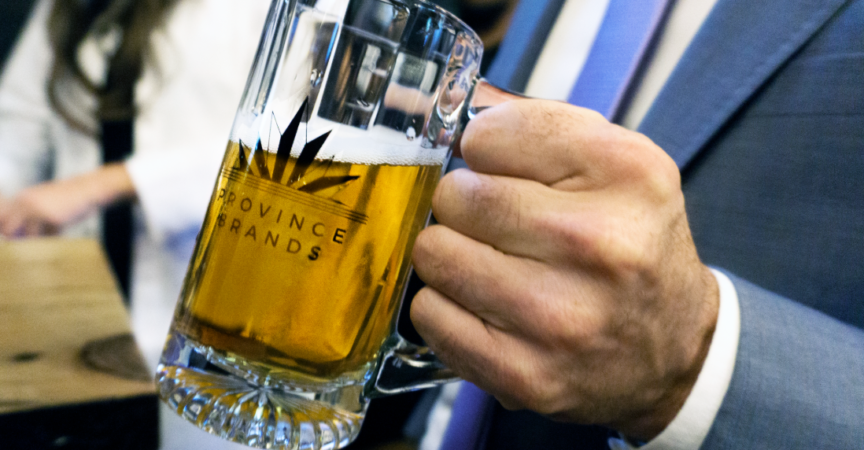Hops On High: The Rise Of Cannabis Beer
It’s a mild summer afternoon in Calgary, and the patio of a trendy 17th Ave bar is packed with patrons eager to soak in the first of summer’s sunshine, with the requisite pints or bottles of beer in hand.
But, if you were to take a closer inspection of those pint glasses and bottles, you’d discover that some of the brews contained within aren’t your garden variety craft beers. In fact, some have no alcohol at all, yet they’re imparting an incredibly pleasant and relaxing effect on the patron consuming it. It’s because they’re drinking a cannabis beer.
The scene described here is, unfortunately, a piece of fiction. We’re getting one step closer to it with the legalization of marijuana this July, although this only permits the regulated sale of cannabis from provincially-appointed licensed retailers. There’s no definitive word yet on licensing consumption in public venues, and edible cannabis products aren’t slated for legalization until 2019. But that isn’t stopping some enterprising Canadians from getting ahead of the game.
While there are already plenty of cannabis beverages in the grey market—dealcoholized beers, lemonades and even kombuchas infused with THC (tetrahydrocannabinol—the chemical responsible for most of cannabis’ psychological effects)—there’s one beer under development that is made from the cannabis plant itself.
Dooma Wendschuh is one of the people behind this innovative new brew. As the co-founder of Province Brands, Wendschuh is working with a team of accomplished brewers and researchers to develop the new cannabis beer.
“We found a way to actually use the plant matter itself—the stalks, the stem and the root of the plant, and of course some of the trim as a starting material for brewing the beer,” Wendschuh explains. The result is a beer that looks much like you’d expect it to—pale yellow in colour and slightly effervescent but with a nutty, savoury characteristic and a dry wine-like finish, as Wendschuh describes. “It’s made from marijuana, but it doesn’t taste a lot like cannabis.” But it was a long road of research and development to get to that point. “The first batch tasted like rotten broccoli. The second batch tasted about the same,” he remembers with a laugh. “We really felt like no matter what we did, and what changes we made, the beer was going to taste absolutely terrible.”
He enlisted contract research organizations in Colorado, where Wendschuh used to live and where working with cannabis was legal, and the team started getting closer to a palatable product. They even flew in a flavour consultant from Tennessee. “But we did the math, and he was using so many seeds, which are very expensive,” says Wendschuh. “It would have cost $30 a bottle to make which wasn’t going to work either.” The breakthrough came when Wendschuh contacted one of his favourite Colorado breweries—Grist Brewing Company. Its founder and brewmaster Rob Kevwitch left a career in chemistry to pursue a passion for making beer, and he was able to give Wendschuh a slew of tips and advice that resulted in a great-tasting beverage brewed from cannabis.
The taste wasn’t the only important factor in developing a cannabis beer. Wendschuh and his team were able to tweak the onset, or ‘dose-response curve,’ to mimic that of alcohol. While traditional cannabis edibles may take up to an hour to kick in and result in a high that lasts for hours, their cannabis beer takes effect sooner and the high that doesn’t last as long, increasing the approachability of the product to those that are more accustomed to drinking alcohol.
Wendschuh is guarded when it comes to the exact brewing process, and understandably so. Province Brands has applied for a provisional patent for brewing beer from cannabis. “The end result will be us owning the entire category of beer brewed from the cannabis plant.”
Japanese brewery Kirin holds a similar patent for making beer from the soybean plant. “To this day, anyone that wants to make a beer from the soybean plant is paying Kirin royalty for that,” Wendschuh says. “We thought there was value there.”
Now that the Province Brands team has nailed down a patent-pending process for a tasty cannabis brew, they’re searching for a building to house their purpose-built brewery, which will also have a marijuana license. The venture is being made possible through a collaboration with Cannabis Wheaton Income Corp., a collective that invests in cannabis cultivation companies. The brewery will eventually produce bottles, cans and even kegs of their signature brew. The latter-most packaging method hints at where Wendschuh hopes social cannabis consumption will soon head.
“Cannabis is best consumed with friends,” Wendschuh explains. “We’re hoping that Canada will follow the lead of a few other jurisdictions and will allow social consumption at some point in the not too distant future.”
Wendschuh is far from the only voice promoting the social consumption of cannabis in the country. Lisa Campbell is the woman behind Toronto’s Infused Innovation events which showcases the latest in cannabis beverages. She has also helped dispensaries in British Columbia develop teas, powdered drinks and even performance-enhancing beverages from cannabis. But in her new role at Lifford Wine & Spirits, she’s helping the national beverage distributor launch a new subsidiary company called Lifford Cannabis Solutions which will represent cannabis products for the company from coast to coast.
Like Wendschuh, Campbell sees an elevated future for Canada. While the federal task force on marijuana legalization warned against the co-location of cannabis and alcohol, suggesting that venues might be licensed for the sale and consumption of alcohol or cannabis, but not both, Campbell supports a freer licensing strategy.
“It should be up to consumers what they chose to consume at a restaurant,” she says. “Ideally, in the future, when you go out to dinner you’ll be able to have cannabis-infused beverages on the menu.”
Wendschuh envisions a future where a menu of infused beverages doesn’t just span taste and flavour, but experience too.
“There are so many different strains of cannabis, and they can all have wildly different psychoactive [effects] from each other,” says Wendschuh. “You could go to the bar in the future and say ‘I want to have an energetic feeling’ and someone else would say ‘I want to have a relaxed feeling’ and they could sell a product to you that gives you that feeling.”
While some restaurants and bar owners might feel threatened by the advent of cannabis legalization and social consumption, Wendschuh encourages them to embrace it. Owners of chain restaurants or bars could open up ‘weed’ alternatives which service the consumption of cannabis. “It speaks to your brand, but it’s for people to consume cannabis products as opposed to alcohol and they do that using the appropriate license provision.”
“Over time, hopefully, the government will allow the consumption of both in the same establishments, and when that happens, you just add alcohol to your menu and add marijuana to the menu of the other places that are moving alcohol.”
Then, the futuristic scene we described earlier would change from fiction to fact.









